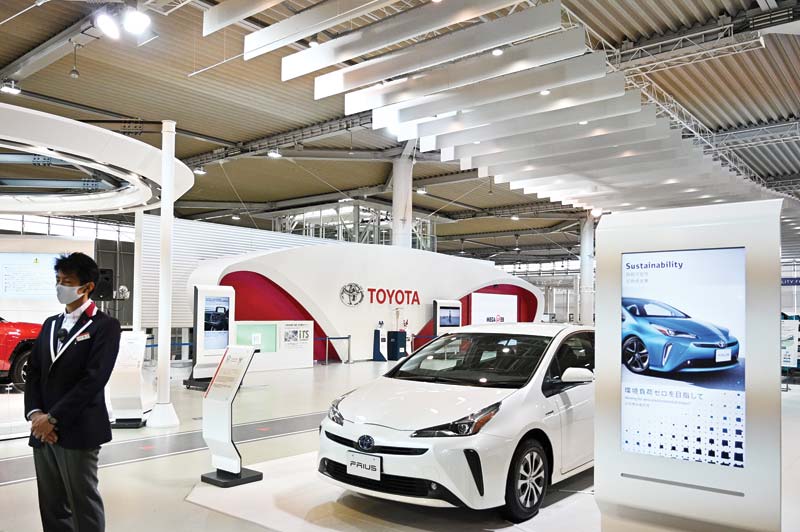 In this file photo taken on November 6, 2020, a staff member stands in a Toyota showroom in Tokyo. Japan's Toyota reclaimed the title of world's top-selling automaker in 2020, according to data released by the firm on January 28, 2021, pushing Volkswagen into second place for the first time in five years.
In this file photo taken on November 6, 2020, a staff member stands in a Toyota showroom in Tokyo. Japan's Toyota reclaimed the title of world's top-selling automaker in 2020, according to data released by the firm on January 28, 2021, pushing Volkswagen into second place for the first time in five years.TOKYO: Japan's Toyota reclaimed the title of world's top-selling automaker in 2020, according to data released by the firm yesterday, pushing Volkswagen into second place for the first time in five years. Toyota said it had sold 9.53 million vehicles around the world last year, overtaking the 9.3 million sales made by its German rival.
The Japanese giant took the lead despite a decline in global sales of more than 10 percent as the auto industry suffered the effects of the coronavirus pandemic. "Despite the COVID-19 pandemic... Toyota was able to continue corporate activities through comprehensive implementation of various infection prevention measures, and by working together with partners including suppliers and dealers," it said in a statement. That was still better than the more than 15 percent drop in sales Volkswagen announced earlier this month.
Toyota said it had benefited from a jump in sales in China, which were up over 10 percent year-on-year, and a better-than-expected performance globally in the October-December quarter. The last time Toyota held the top spot was in 2015, with VW edging it out in the following years. "Toyota's recent strategy of pursuing quality over quantity has... satisfied consumers", especially in North America and China, Koichi Sugimoto, an auto analyst at Mitsubishi UFJ Morgan Stanley Securities, told AFP.
"Improved ties with the Chinese government, partly thanks to China's interest in Toyota's green tech as well as brand-building in the Chinese market by Japanese carmakers in general, also contributed" to sales growth, Sugimoto said. Meanwhile, South Korean automaker Hyundai Motor defied the coronavirus pandemic to post a surprise 78 percent surge in fourth-quarter profits, as robust domestic sales offset weak overseas demand. Net profit in the October-December period jumped to 1.38 trillion won ($1.24 billion) from 772 billion won a year earlier, Hyundai, which along with its affiliate Kia is among the world's top 10 automakers, said in a statement.
Domestic sales in the final three months rose five percent, driven by its luxury Genesis line, while foreign sales dropped by 6.6 percent, the company said. "Robust sales of SUV models and Genesis luxury models as well as declining incentives helped lift revenue in the fourth quarter despite an adverse economic environment," it said. Full-year profits came to 2.12 trillion won, down 33.5 percent from 2019, demonstrating the financial toll the pandemic has taken on global carmakers. GM, Toyota and Fiat Chrysler all reported double-digit declines in US sales last year.
And total US auto sales for 2020 are projected to drop 15.3 percent to 14.4 million, making it the worst year for the industry since at least 2012, according to a December forecast from Cox Automotive. Going into 2021, Hyundai said it will focus on "future business strategies" by producing electric and hydrogen-powered vehicles and aim for an up to 15 percent increase in revenue.
The firm has already rolled out fully-electric cars including the Ioniq and the Kona Electric as it seeks to win a slice of the growing market. Reports this month that it was in talks with Apple to form a partnership to manufacture all-electric cars prompted its shares to spike nearly 20 percent. Hyundai said it had received requests to co-operate on self-driving electric cars from various companies, but did not confirm it was in discussions with Apple. - AFP










